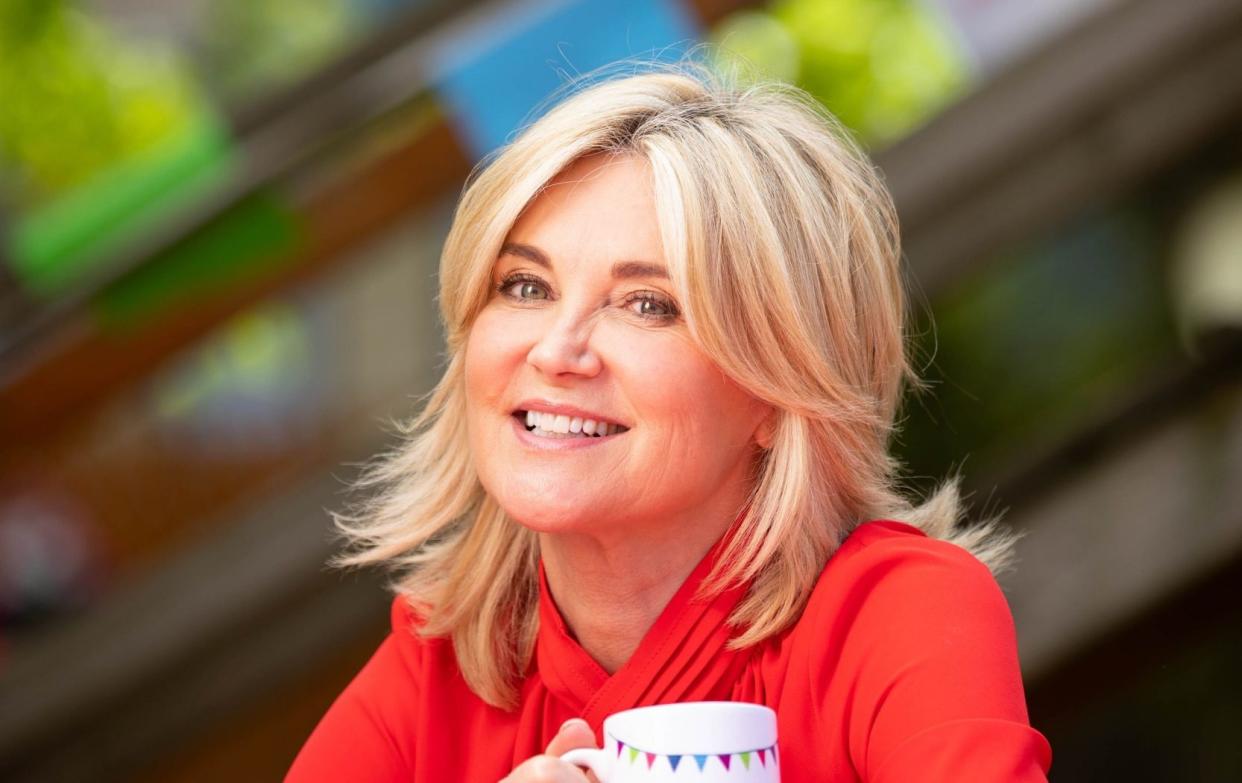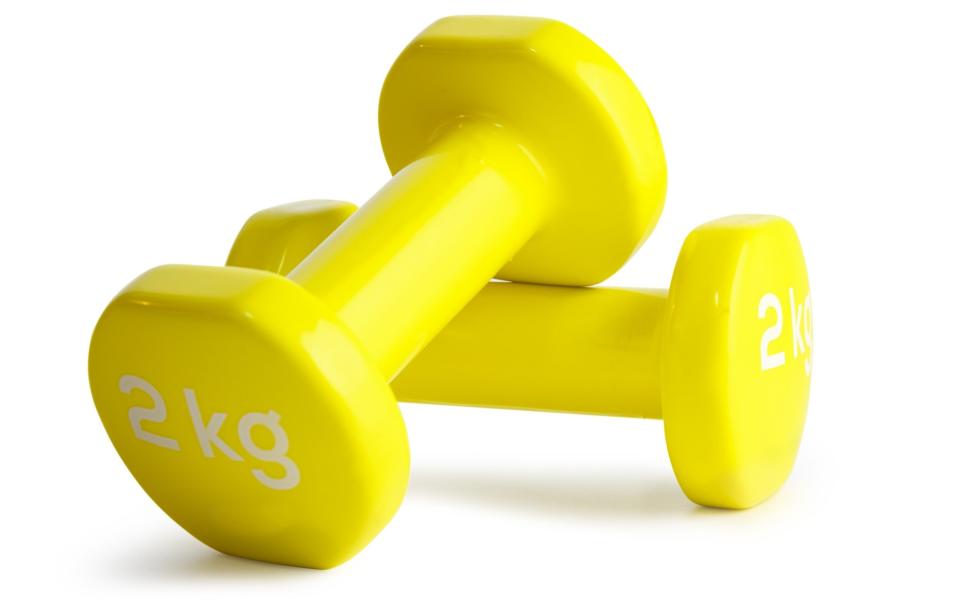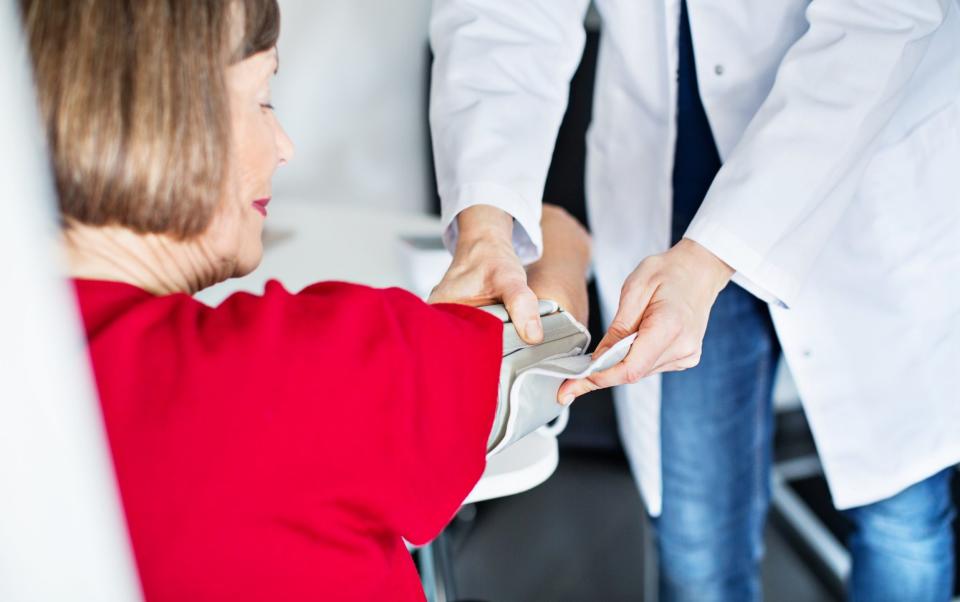Is 60 the danger zone for women’s health?

- Oops!Something went wrong.Please try again later.
At 61, Anthea Turner has said she is now in “the danger zone of life”, during a TV appearance on Lorraine. The TV presenter said: “Sixty is not the new 50, if we are truthful to ourselves.”
She certainly has a point. While all the stats show we are living longer and healthier lives than ever before, 60 is the age when things can start to go downhill, if we’re not careful.
“Our risks of all diseases go up for all of us as we age,” confirms Professor John Stevenson, consultant metabolic physician at the National Heart and Lung Institute. “But for women in particular the risks of heart disease jump after the menopause, as they lose the protective effect of oestrogen on their arteries.”
“Joints wear out and everything slows down,” adds GP Dr Michael Fitzpatrick. “That’s just life.”
So what can we do to mitigate the risks at 60 and beyond, according to the experts?
1. Walk the dog
Exercise is key to immunity. “We’ve got a lot of 60-year-olds coming into the gym now, because they’ve had a scare with Covid,” says Jean-Claude Vacassin, who heads up the team at W10 Performance, a west London personal training studio.
“The best thing you can do for your health at 60 is get fit in your 50s. But assuming you haven’t done that, you need to keep moving. You need to do something for your heart, whether that’s walking the dog or going for a jog; you need something for structural health like Pilates, or yoga, or weight training and you need to do something to stay connected, which could mean doing a class. Social connection is a big part of staying healthy for the over-60s, especially with the Covid temptation to isolate.”
Exercise also releases BDNF, the growth hormone for the brain, which might explain why it can help reduce risk of dementia. Assuming you haven’t done anything before, Vacassin recommends starting with three sessions a week. “The rules don’t really change with age,” he says. Fast walking will do the trick if you don’t like jogging.
2. Lift weights

“The best thing a woman over 60 can do is lift weights,” says functional medicine expert and nutritionist Christine Bailey. “Muscle is a big one as we get older as it supports joint health to prevent arthritis and helps to keep our body composition healthy. Muscle-to-fat ratio is key, because carrying abdominal fat can lead to increased visceral fat and cardiovascular disease. Increased muscle mass also improves insulin sensitivity and helps prevent diabetes.”
3. Ditch the processed food
“Digestive enzymes decrease after the age of 60,” explains Dr Geoff Mullan, co-founder of the preventive health platform, Human People. “That’s why we often see deficiencies in the elderly. So you’ve got to be more careful with your diet to get enough nutrients. At 60 you can’t get away with eating rubbish any more.”
Another reason to ditch processed foods is salt. “It’s important to keep an eye on your salt intake,” says Stevenson, “as that can make an appreciable difference to blood pressure.” So skip the takeaways and ready meals in favour of plenty of fruit and veg. “There’s a lot of talk about five portions a day,” he adds, “but I think four portions is fine and anything at all is beneficial.”
4. Get your nutrient levels checked
It’s worth checking that you are absorbing nutrients, with a nutrient test from your GP, says Mullan. “Vitamin D and magnesium are very important in women over 60, as they help prevent osteoporosis. Magnesium is chronically low in most people because it’s disappeared from our soils.” It’s also worth testing for B12, folate, ferritin (iron) and Vitamin B5, which are the most likely to be deficient in women over 60, says Mullan.
5. Keep an eye on your protein intake
“There’s a myth that we need less protein as we age,” says Bailey. “But that’s rubbish. Our protein needs don’t go down. We still need at least one gram per kilo of body weight, more if you’re active and plenty of women aren’t getting that, especially as they get older and lose their appetite. Protein is essential to immune health, so it’s important as our immune system functions less effectively as we age.” Protein is also vital for wound healing - worth noting if you’re having surgery.
6. And what about alcohol?

“I’m afraid the latest research shows that even one drink a day increases the risk of cancer,” says Bailey. What? Not even the odd glass of wine? “I’m sorry there are very little benefits from alcohol,” she confirms.
Try drinking coffee or tea instead: the latest research shows four to six cups a day of coffee is linked to reduced risk of dementia and stroke. And make sure sure you drink enough water. This is something the older generation tends to forget. “Aim for 1.7-2 litres a day,” says Bailey. “It doesn’t have to be only water; other liquids in fruits and smoothies count.”
7. Stop smoking
It’s not too late to stop at 60. “Smoking is the most obvious preventable risk factor,” explains Stevenson. “You get a quick reduction in risk immediately after you stop. Ten years after that, the increased risk of disease is pretty well clear, but there’s a gradual reduction over that time.”
8. Watch out for weight creep
“Obesity increases visceral fat, which is linked to insulin resistance and that can lead to the arteries becoming furred up,” says Stevenson. “It also affects your cholesterol profile, so that you have less of the healthy HDL and more of the damaging LDL cholesterol, which can place you at risk of cardiovascular disease.”
Metabolism does tend to slow as we age, but that’s likely down to lack of activity, rather than an inevitable decline in our sixties, says Vacassin.
9. Consider HRT
“Oestrogen protects the arteries, but after the menopause the risk of heart disease in women jumps,” explains Prof Stevenson. “Certainly by their 60s, women have caught up with men. HRT is protective as oestrogen improves arterial function and stops them from furring up.” But can we start HRT at 60, if we haven’t taken it before? “Your dose will need to be lower and it depends on your risk factors,” says Prof Stevenson.
10. Get your full quota of sleep
“Sleep is a clearing out process,” says Mullan. “It gets rid of the toxic waste in the brain which can cause inflammation. That’s why people who sleep less (than they need), are at greater risk of dementia at a younger age.” The majority of us need seven to eight hours a night, but the key thing is to turn in when you feel sleepy. If you need an alarm clock to wake up, you need to go to bed earlier. If you wake up naturally you’ll know you’ve met your sleep needs.
11. Check your blood pressure

Women over 60 are more prone to high blood pressure and other cardiovascular issues. “It’s worth getting a home machine, or going for regular checks,” says Stevenson. “If your systolic pressure is over 140 and diastolic pressure is more than 90, that’s too high. If it’s a little over you can probably bring it down by reducing salt in your diet, but if it’s much higher it needs treatment.”
12. Don’t miss screening checks
“Women don’t need smear tests any more, though there’s an increase of breast cancer after 60. Early detection is important and women should keep their mammogram appointments,” says Fitzpatrick. Half of breast cancers are diagnosed at age 61 or older. For colon cancer, the median age is 68, so don’t ignore gut symptoms, such as changing bowel habits, constipation or diarrhoea, especially if you have blood in your stools.
Hearing tests are also vital. Hair cells in the inner ear naturally die off with age and while many of us don’t like the idea of wearing a hearing aid, hearing loss is linked to brain function and dementia.
13. Add Vitamins A and C to your skincare regime
“Skin is generally dry in our 60s, so now is time to switch to a richer moisturiser. Vitamin A and C will help you get your glow back – everyone needs Vitamin C in the morning and Vitamin A at night,” says Dr Vicky Dondos, author of the Positive Ageing Plan. “A prescription strength retin A is best after the menopause, but if your skin can’t take it, start with 0.3 per cent and work up to 1 per cent. It will improve the function of all the skin layers, help the dermis stay plump and support the elastin. It will also slow collagen breakdown and stimulate collagen production.”
Switching to a richer moisturiser, like Epionce Intensive, will help replenish dry 60-something skin.

